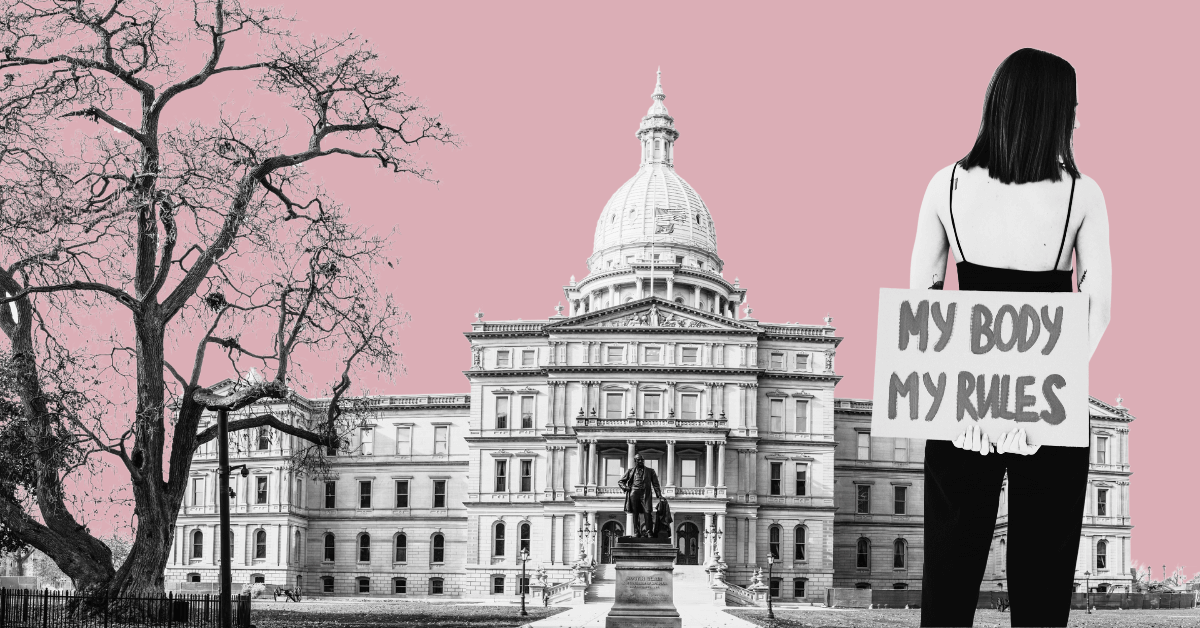
Democratic state lawmakers voted this week to finalize a series of bills that—if signed into law—will dissolve several long-standing legal barriers to reproductive care in Michigan.
MICHIGAN—Legislation that’s set to be signed into law this month by Gov. Gretchen Whitmer will repeal several “medically unnecessary” restrictions on reproductive health care in Michigan, with the goal of protecting and expanding access to abortion for more Michiganders statewide.
The state Senate on Wednesday finalized eight bills—Senate Bills 474, 476, 477, and House Bills 4949, 4951, 4953, 4954, 4955, and 4956—that comprise what lawmakers have collectively coined the “Reproductive Health Act.” Whitmer outlined the legislation as a top priority for Michigan in a recent speech, and is expected to sign it into law before the end of the month.
“For years, Michigan has had politically motivated and medically unnecessary restrictions on abortion on the books. These laws criminalized doctors for providing medical care, jacked up out of pocket health care costs, and imposed needless regulations on health centers,” Whitmer said in a statement after the bills were passed. “This legislation (to repeal those restrictions) makes important steps toward expanding access and protecting our personal freedoms.”
The bills—sponsored by Sens. Sarah Anthony (D-Lansing), Erika Geiss (D-Taylor), and Sen. Mary Cavanagh (D-Redford Township)—are set to tear down several legal barriers to abortion access by repealing state laws that have prevented women from receiving health care in Michigan.
Among them: Several targeted restrictions on abortion providers—otherwise known as TRAP laws—which are only applicable to facilities that offer abortion and other reproductive health care, and which physicians have deemed as “unnecessary” for both patient care and safety.
Here’s a quick overview:
State Licensing Tweaks
The newly passed bills repeal a raft of unnecessary (and cost prohibitive) state rules that have effectively prevented new clinics from opening their doors in underserved areas of the state—including a state law signed in 2012 by former Republican Gov. Rick Snyder which currently requires clinics to perform at least 120 abortions every year in order to be licensed.
When it was passed, Republicans claimed the legislation was designed to help protect the health of pregnant women, but lawmakers said the restrictions only created “abortion deserts” in Michigan—forcing many women to miss work and take long trips just to receive care.
The law has since hindered health care by forcing some abortion clinics with less demand to close, and effectively blocked Planned Parenthood of Michigan from offering procedural abortions at 12 of its 15 health centers—making the organization’s northernmost clinic in Flint.
That means Planned Parenthood patients living in the Upper Peninsula who are in need of a procedural abortion must travel at least seven hours by car to commute to their nearest clinic.

Lawmakers said that dearth of access is an unacceptable inconvenience for patients, and that repealing the limitations will make it easier for providers to expand operations across Michigan.
“Michiganders deserve the autonomy, power and freedom to make their own medical decisions without needless interference from those without experience or expertise on the matter,” Geiss said in a statement. “With the finalization of the Reproductive Health Act, we are making real progress to ensure that people who can become pregnant do not have their rights infringed and instead have the freedom to reliably access the reproductive healthcare they rightfully deserve.”
The bills also erase various state-mandated screening and exam procedures that only apply to abortions, as well as rules that have prevented the state Department of Health and Human Services from awarding grant money for ultrasound equipment to abortion providers.
Insurance Coverage
Among the other bills included in the Reproductive Health Act is long-sought legislation to repeal the state’s Abortion Insurance Opt-Out Act, which forces Michiganders to purchase separate riders in order to have abortion care covered under their health insurance plans.
That restriction has been criticized by opponents as a “rape insurance” law, including by then-state Sen. Gretchen Whitmer, who called the legislation “ignorant” and “repulsive” in 2013.

Gov. Gretchen Whitmer (Photo by JEFF KOWALSKY/AFP via Getty Images)
Lawmakers have said that repealing the state law which requires additional insurance riders won’t force private insurers to begin including abortion care as part of their existing coverage. Instead, it would simply allow them to wrap abortion care into their existing health plans.
Other Changes
The bills would also reportedly lift a ban on what Republicans inaccurately call “partial-birth” abortions, which is usually the dilation and extraction procedure used in late-term abortions.
These procedures are extraordinarily rare—99% of all abortions taking place before 20 weeks, and only 0.2% occur via the dilation and extraction procedure—and often are performed in cases of miscarriages, fetal anomalies, or health risks to the pregnant woman.
The legislation would also allow people to sue if their constitutional rights are infringed, as well as end a ban on colleges and university resources from providing referrals to abortion services.
“Every Michigander should have access to the resources required to make informed decisions about their health,” Cavanagh said in a statement this week. “By empowering institutions of higher education to provide these resources, we are ensuring Michigan residents are knowledgeable and prepared to thoughtfully exercise their reproductive freedom.”
Will of the Voters
Michigan voters turned out in full force last November to support Proposal 3 and cement the right to reproductive freedom—including abortion care—into the state Constitution. And Democratic state lawmakers quickly found more work to be done (and old laws to repeal) to help ensure Michiganders are able to fully exercise their new constitutionally protected rights.
The protections provided by Proposal 3 effectively ensured that nobody will ever be prosecuted with a crime for providing or receiving reproductive health care in the state of Michigan. The amendment also stated that all Michiganders have a specific right to reproductive freedom.
That includes the right to make and carry out any and all pregnancy-related decisions (including abortion) and it bars the state from enacting any laws or regulations that would infringe upon those basic human rights without a “compelling state interest in the health” of the patient.

Abortion rights protesters attend a rally outside the state Capitol in Lansing, Mich., on June 24, 2022. (AP Photo/Paul Sancya, File)
Lawmakers took that a step further in April by repealing a nearly 100-year-old state law that had criminalized abortion care in Michigan, aligning state law with the newly amended State Constitution under Proposal 3—which was passed with about 57% of the overall vote last year.
In doing so, Michigan has emerged as a nationwide beacon for choice and bodily autonomy.
Since the US Supreme Court struck down Roe v. Wade last year, abortion has now been banned or more tightly restricted in 21 states, reports the New York Times. And although Michigan is among 21 states that have enacted new protections in the wake of the ruling, Democratic lawmakers and other advocates for reproductive freedom said there was more work to be done.
“If we have a constitutional right to reproductive freedom, but it’s not accessible for everyone, then it’s not actually a right,” Speaker Pro Tempore Laurie Pohutsky (D-Livonia) told The ‘Gander.
What’s next?
Many advocates for reproductive freedom have contended the legislation that was passed this week didn’t go far enough to expand access to reproductive health care in Michigan—especially after some proposed changes were eliminated from a draft of the legislation before it passed.
Earlier proposals passed by the Senate last month sought to repeal a mandate in state law that currently forces patients who seek an abortion to wait at least 24 hours before they can get care. Under this mandate, they must also receive pamphlets of misinformation about alternative options to abortion.
Officials at Planned Parenthood of Michigan said those rules only created unnecessary delays for patients in need of essential care—especially for those who might not have realized there was a waiting period, and already drove hundreds of miles to receive abortion care.
But because Democratic lawmakers only had a narrow, 56-54 majority in the House and one Democratic lawmaker—Rep. Karen Whitsett (D-Detroit)—opposed some of the measures included in the bills, the Senate opted to leave those regulations untouched in the bills.
Whitsett’s opposition also essentially forced state lawmakers to abandon plans to repeal a longstanding state ban that currently prevents Medicaid from covering abortions except in cases of rape or incest, or when the life of the mother is at risk, as well as several other key changes that advocates had argued were necessary for bolstering access to health care.
In a statement, the Michigan Democratic Party labeled the bills “a huge step forward,” but also noted “more work to do” to further strengthen abortion rights and access in Michigan. Whitmer has also vowed to “continue to take action” to protect access to reproductive health care.
“Since the Supreme Court’s overturning of Roe v. Wade, it is incumbent upon us at the state level to ensure all Michiganders, especially those in marginalized and underserved communities, have access to reproductive healthcare,” Anthony said in a statement. “By finalizing the Reproductive Health Act, we are placing the power of personal choice back into the hands of the people.”
READ MORE: Whitmer vows to keep up fight for reproductive freedom in Michigan
For the latest Michigan news, follow The ‘Gander on Twitter.
Follow Political Correspondent Kyle Kaminski here.
Support Our Cause
Thank you for taking the time to read our work. Before you go, we hope you'll consider supporting our values-driven journalism, which has always strived to make clear what's really at stake for Michiganders and our future.
Since day one, our goal here at The 'Gander has always been to empower people across the state with fact-based news and information. We believe that when people are armed with knowledge about what's happening in their local, state, and federal governments—including who is working on their behalf and who is actively trying to block efforts aimed at improving the daily lives of Michigan families—they will be inspired to become civically engaged.


Trump claims the title of ‘father of IVF’ in Fox News town hall with women voters
BY SHAUNEEN MIRANDA, MICHIGAN ADVANCE Former President Donald Trump fielded questions from women voters during a Fox News town hall in Georgia that...

White House says health insurance needs to fully cover condoms, other over-the-counter birth control
The proposal comes days before Election Day, as Vice President Kamala Harris affixes her presidential campaign to a promise of expanding women's...

Meet the Michigan woman who started with a single sign—and ended up creating a movement to protect reproductive health care
With more than 45,000 followers across her social media accounts, OB-GYN PA-C Nikki Sapiro Vinckier is using her platform to combat misinformation...

Michigan free family planning program reaches 20K in 1st year
BY KYLE DAVIDSON, MICHIGAN ADVANCE MICHIGAN—After launching its “Plan First!” program just over a year ago, the Michigan Department of Health and...

Right to Life wants these Republicans to bring their anti-abortion agenda to Lansing
Anti-abortion groups want Michiganders to elect Republicans to take over the state House of Representatives—and then restrict reproductive rights....




